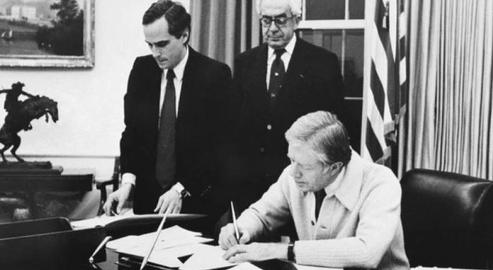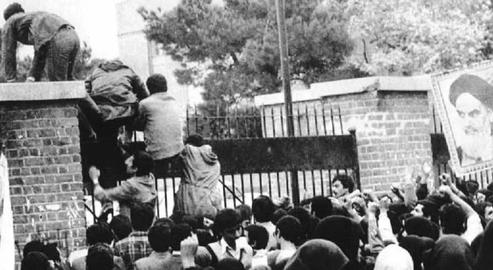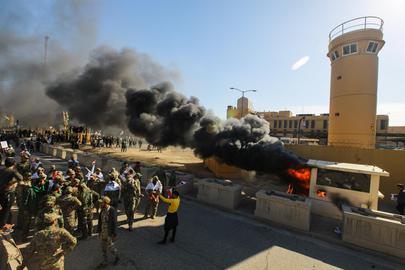Forty years ago today, an agreement between the Islamic Republic of Iran and the United States of America was finalized, ending the first major crisis in relations between the two countries after the Islamic Revolution. This agreement was mediated by Algeria, and so is known as the Algiers Accords. It led to the release of US hostages at the time, but hostage-taking continues in Iran to this day.
***
Two days after the Algiers Accords were reached in 1981, the 52 US embassy employees who had been taken hostage in November 1979 were released in Tehran. But the embassy remained occupied by the Islamic Republic, and hostage-taking became an integral part of the country’s foreign policy.
Sanctions imposed by the Jimmy Carter administration at the beginning of the hostage-taking were lifted, but sanctions related to military matters and arms sales to Iran remained. Forty years later these sanctions were reinforced and increased in the last week of the Donald Trump administration. At the same time Iran recently confirmed that it had sentenced US-Iranian businessman Emad Edward Sharqi to 10 years in prison for espionage without a trial, making him the fourth dual US-Iranian citizen to be arbitrarily detained in the country.
United States Made Commitments
The Algiers Accords had two main purposes: to end the 444 days-long US Embassy hostage situation and to establish a special tribunal between Iran and the United States to deal with the hundreds of trade, commercial and cultural disputes that had erupted between the two countries.
Prior to the Islamic Revolutions evolution, due to the warm and friendly relations between Iran and the United States, their respective private sectors had enjoyed a very wide and varied relationship. This was destroyed in 1979.
As part of the agreement that released the hostages, the United States made four commitments to Iran in return: first, that it should not interfere directly or indirectly in the affairs of the Islamic Republic, and second, the release of frozen Iranian assets in the US and the return of the money owed as compensation. This included the lifting of sanctions that the US had imposed on Iran following the initial hostage-taking.
The third US commitment was to drop all legal claims against Iran in US courts. Between the time of the hostage-taking and the first anniversary of the Islamic Revolution, more than 440 complaints had been filed against the government of Iran and the revolutionary authorities.
The fourth and final commitment of the United States was to return the property and assets of Mohammad Reza Pahlavi, the last Shah of Iran, and his family to the Islamic Republic of Iran. the This commitment violated the fundamental US principle of respect for property, and the United States may only have accepted it because of pressure to free the hostages. But Iran later was not able to clearly prove which of the Shah’s properties should be confiscated in the United States, and so the US did not end up fully complying with this commitment.
Court Resolves Decades-Old Disputes
The second part of the agreement was to establish a special court to deal with disputes arising from the 1979 Revolution. The Iran-US Arbitration Court still exists today and is based in The Hague, and in the past 40 years has issued nearly 4,000 final rulings on disputes between the two countries. Other cases are still pending.
The Iran-US Arbitration Court consists of nine members, of whom the Islamic Republic and the United States each appoint three, while the remaining three are selected by mutual consent. The court is currently chaired by Nicholas Michel, a Swiss lawyer and diplomat.
This court only deals with disputes between Iran and the United States that arose before January 1981. In other words, the vast differences that the two countries have had since the Algiers Accords in the last 40 years have nothing to do with the Arbitration Court.
With the complete severance of US political and economic relations with Iran and the subsequent withdrawal of the United States from the Joint Comprehensive Plan of Action (JCPOA) agreement and cancellation of the "friendship pact" between the two countries by the Trump administration, this court is now the only mediator between the two countries.
Algiers Accords Failed
The Algiers Accords had no practical effect other than the release of American hostages at the embassy and the establishment of a tribunal.
Very shortly after the agreement Iran changed tack, switching to the hostage-taking of Americans by proxies through Lebanese Hezbollah for political gain. In recent years Iran has also arbitrarily American citizens and Iranians with dual US citizenship inside Iran. As such, the 40th anniversary of the Algiers Accords, which should have been the beginning of a lasting rapprochement between Iran and the United States, has passed practically without comment.
Related coverage:
Monopoly of the Guards: How Does a Military Organization Control the Iranian Tech Sector?
Khamenei and the US: No Audacity for Peace, No Courage for War
Decoding Iran’s Politics: Iranians’ Perception of the Hostage Crisis of 1979
40 Years After Taking Americans Hostage, Iranians are Poorer and Less anti-American
visit the accountability section
In this section of Iran Wire, you can contact the officials and launch your campaign for various problems



























comments